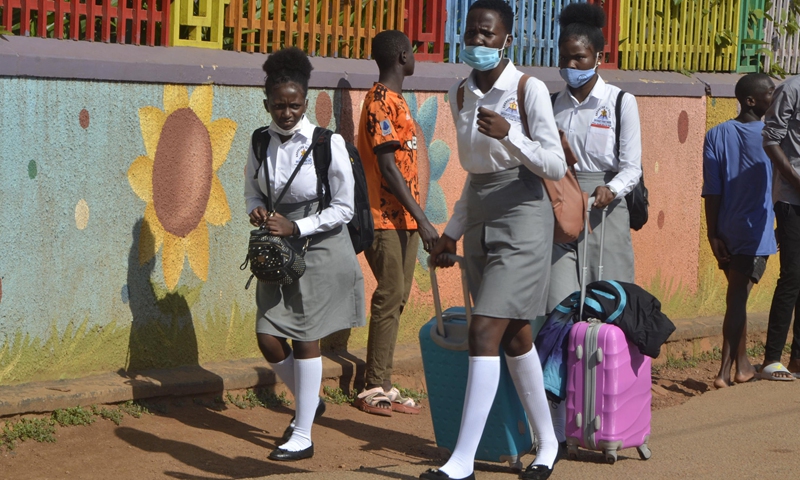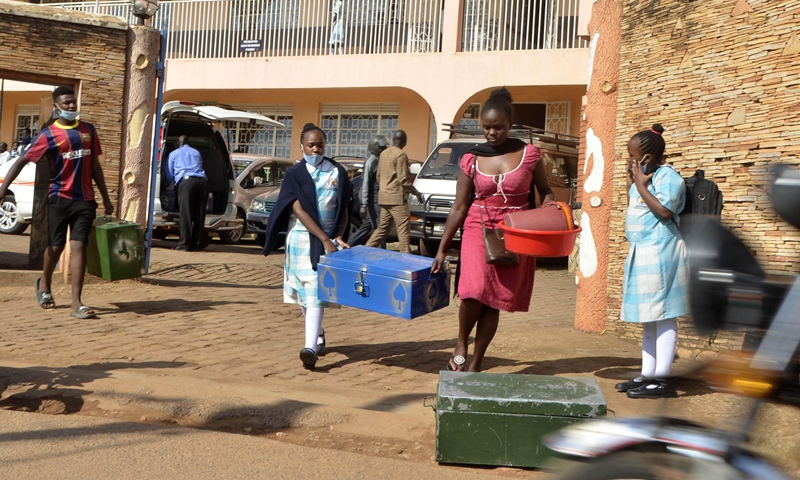
Students prepare to leave school in Kampala, Uganda, June 7, 2021.(Photo: Xinhua)

Photo taken on June 7, 2021 shows a school closed amid the COVID-19 pandemic in Kampala, Uganda. (Photo: Xinhua)

Students prepare to leave school in Kampala, Uganda, June 7, 2021. (Photo: Xinhua)
Uganda has reinstated some of its lockdown measures as it strives to contain the second wave of the COVID-19 pandemic.
President Yoweri Museveni, in a televised address on Sunday, said the COVID-19 situation in the country is worsening by the day compared to the first wave last year when cases would increase within months not days or weeks as it is now.
"In the previous wave, it took us three to four months to get to the current state of critical and severe patients, while in the second wave, it has taken us less than two weeks to get to the same situation," the president said.
"In this wave, the intensity of severe and critically ill COVID-19 patients and deaths is higher than what we experienced in the first wave of the pandemic," he said.
Ministry of health figures show that as of June 6, cumulative COVID-19 cases stood at 52,929, reported confirmed deaths at 374 and recoveries at 43,487.
Measures
Museveni announced a series of measures, some old, to stop the spread of the virus.
Public gatherings with the exception of cabinet and parliamentary meetings are banned for a period of 42 days. Places of worship, including churches and mosques, are also suspended for the period.
These gatherings, Museveni said, are part of the reason as to why the virus was quickly spreading in the country.
Only 20 people, according to Museveni, are allowed to attend marriage or funeral ceremonies. This restriction was previously eased after the country started registering low infection rates late last year.
The government has also banned private and public transport from one district to another. For travels with a district, only three people, including the driver, are allowed in a car. Public service vehicles will allow a certain number of people as stipulated by the ministry of health.
Museveni urged people within central business district to adhere to preventive measures, otherwise shopping malls and shops will also be closed.
Night curfew remains in place, and entertainment centers, including bars, will remain closed.
Schools and institutions of higher learning are also closed. They were reopened last year in a phased manner after COVID-19 cases fell in the country.
Ministry of health figures show that a total of 948 cases were reported in 43 schools from 22 districts.
"We believe this number is much higher, only that most schools are not reporting," Museveni said.
"The high number of infections in schools is largely attributed to poor compliance to SOPs, inadequate sanitation facilities and overcrowding in some schools," he said, referring to standard operating procedures.
Museveni warned that failure to comply with these and other control measures would lead to the reinstating of a total lockdown.
The government has also introduced fines against violators of COVID-19 prevention measures.
"Violation of these measures will lead to fines that will be given out soon in a statutory instrument signed by the permanent secretary to the treasury," the president said.
Enhanced Response
Museveni said the government will install a 300-bed field hospital per regional referral hospital, creating an additional 4,500 beds.
Uganda now has 3,793 hospital beds that can be used for treatment of COVID-19 patients.
Museveni said Uganda will seek to purchase vaccines from China, Russia and the United States, in addition to expected delivery of doses through the World Health Organization COVAX sharing facility and those donated by China, to scale up vaccination efforts to combat the pandemic.
He said the government is committed to "vaccinating all the 21.9 million eligible Ugandans, starting with the priority groups of 4.8 million people."
As of June 6, the ministry of health had vaccinated 748,676 people across the country; 712,681 of them with the first dose and 35,995 with second dose of AstraZeneca vaccine.
